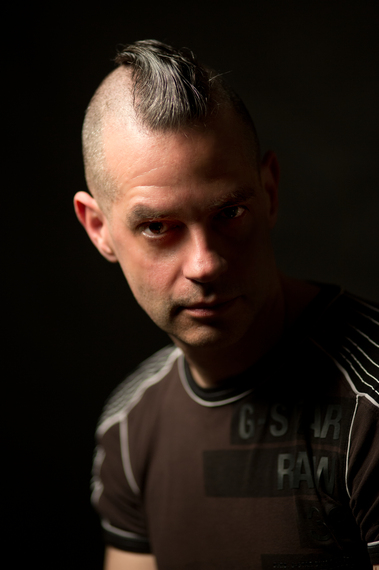John R. Gordon is one of the finest novelists working today. His latest novel, Souljah, about a gay former child soldier navigating the harsh realities of life as a newly-arrived immigrant in London, is a spellbinding masterpiece that has just been shortlisted for a Lambda Literary Award. We spoke shortly after his Lambda nomination, and his excitement about being nominated for the prestigious award was palpable.
How important are prizes such as the Lammys in terms of providing recognition for LGBT literature?
"Very, I think. They tell the wider literary world that LGBT writing deserves to be (and is being) treated as seriously as heterosexual-centred writing. There's a nonsensical assumption (even among many LGBT people) that work that is important puts heterosexual experiences centre-stage. The Lammys rebut this. Awards generally are really a help for any art-form that isn't mainly commercial in orientation."
What was your reaction when you received the nomination?
"Delight! Souljah is a powerful novel, but its tough subject-matter means some readers might pull back from it. Anyone who's read it has been strongly affected by it, and surprised by how gripping and moving they found it: a common response has been, "I often felt as though I was there". A nomination is great because it's a reassurance of literary quality: I hope that'll sway more readers into giving this "scary" novel a go."
This is a book that you've spent a great deal of time, research and energy putting together. Talk me through the genesis of the book and what inspired you to write this particular story.
"So many inspirations! The civil war in Liberia, where the teenage soldiers on roadblocks, whacked out on cocaine and gunpowder, wore women's wigs and dresses while wielding Kalashnikovs. Drag as a repudiation of machismo, and as a parallel to African ceremonial masking and warpaint; the murder of sweet, fey schoolboy Damilola Taylor here in London; a Zulu lover of mine who grew up in Soweto during apartheid and hung out with tough street drag-queens; the parallels between London street gangs and African teenage and child soldiers; narratives by, and novels and documentaries about child soldiers. And this simple thought: "some child soldiers will grow up to be gay. They (almost certainly) won't tell their stories. So I will." I loved the idea of a refugee protagonist, as refugees are so often reviled in the west. I wanted readers to have to identify with this unlikely and very different hero without the usual comfy 'bridge' of a white, middle-class 'saviour' character or narrator. I also feel very strongly that Stanlake is a universal character: because who of us, faced with adversity, wouldn't do the terrible things he does? We all have inner child soldiers. And once you've done these things, how and where do you find redemption? And how do the lost young men of the west find their meaning, their way forward? It mattered very much to me to present a narrative where they save each other."
You created a short film of Souljah before you transformed the central story - that of a gay, former child soldier living in London - into a novel. How exciting was it to move from one medium to another with this story?
"It was hugely liberating. I love the short film (which won lots of awards), but unless you have a huge budget, you can't - for instance - recreate a whole civil war in Africa. Whereas in a novel, you can roam at will. And it was a wonderful opportunity to explore the interiority of the characters and their violently oppositional world-views."
What are you working on at the moment?
"A project called Yemi & Femi, about two young black gay best friends and their madcap exploits, which has become my way of writing about HIV/AIDS using comedy and street idiom, and which I'm simultaneously evolving as a play, comic-book and short film."
Finally, what advice do you have to give to other novelists out there who are just starting out on their journey?
"Thanks to the internet you can get your work out into the world in a way you never could before, whatever it's about, so write exactly what you want, as honestly as you can, and offer it to the world without self-censorship or compromise. And also: work hard. Start. Keep going. Finish. Be tough on your fancy phrases. Rewrite until you can't stand the sight of it. Then rewrite one more time. Claim your identity as a writer. Put writing first as often as you can. Don't expect to do this and have a comfortable, orderly bourgeois career-progression. Read writers on writing, read writers' letters. These are your spirit ancestors, your colleagues beyond the mirror. Welcome them in and let them welcome you."
Who are your LGBT literary heroes?
"James Baldwin, who showed me you could write about what really mattered to you. Genet for his profane poetry of the underclass, the prison-cell. Burroughs for his acid letters and interviews and lack of sentiment; for his Wild Boys. Audre Lorde for her insistence on bringing her whole self to everything she did: that total and merciless honesty. That beautiful spirit and astute observer and wonderful and absolutely human poet, Essex Hemphill, who I once had the good fortune to meet. And my best friend and oftentimes collaborator Rikki Beadle-Blair, whose work is so bold, fearless and powerful it always inspires me; and who always challenges me to push myself so much further than I ever thought I could go."
John R. Gordon's Souljah (Team Angelica Press) is available to purchase from Amazon. You can connect with John R. Gordon via Twitter.

